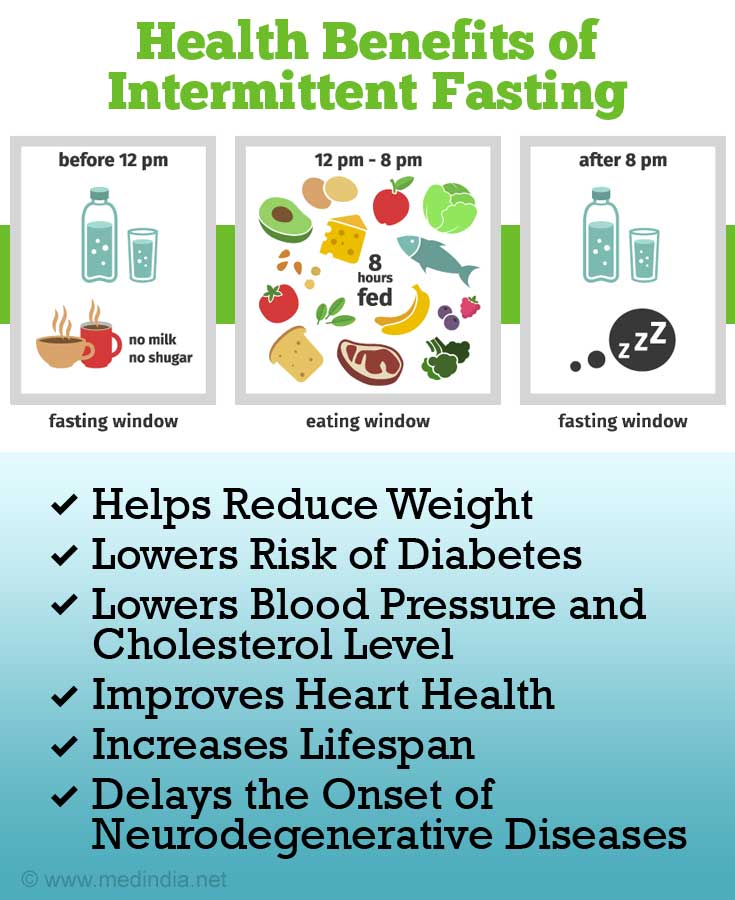- Intermittent fasting: the science of going without - (https://www.ncbi.nlm.nih.gov/pmc/articles/PMC3680567/)
- Intermittent Fasting and Human Metabolic Health - (https://www.ncbi.nlm.nih.gov/pmc/articles/PMC4516560/)
- Fasting for weight loss: an effective strategy or latest dieting trend? - (https://www.ncbi.nlm.nih.gov/pubmed/25540982)
- Impact of intermittent fasting on health and disease processes - (https://www.ncbi.nlm.nih.gov/pubmed/27810402)
- Impact of caloric and dietary restriction regimens on markers of health and longevity in humans and animals: a summary of available findings - (https://www.ncbi.nlm.nih.gov/pmc/articles/PMC3200169/)
- Effects of intermittent fasting on health markers in those with type 2 diabetes: A pilot study - (https://www.ncbi.nlm.nih.gov/pmc/articles/PMC5394735/)
- Intermittent fasting combined with calorie restriction is effective for weight loss and cardio-protection in obese women - (https://www.ncbi.nlm.nih.gov/pmc/articles/PMC3511220/)
- Role of Intermittent Fasting on Improving Health and Reducing Diseases - (https://www.ncbi.nlm.nih.gov/pmc/articles/PMC4257368/pdf/ijhs-8-3-v.pdf)
- Positive effects of intermittent fasting in ischemic stroke - (https://www.ncbi.nlm.nih.gov/pubmed/28115234)
- - (https://www.ncbi.nlm.nih.gov/pubmed/27737674)
- Metabolic Effects of Intermittent Fasting - (https://www.ncbi.nlm.nih.gov/pubmed/28715993)
- Cardioprotective effect of intermittent fasting is associated with an elevation of adiponectin levels in rats - (https://www.ncbi.nlm.nih.gov/pubmed/19423320)
- Effects of eight weeks of time-restricted feeding (16/8) on basal metabolism, maximal strength, body composition, inflammation, and cardiovascular risk factors in resistance-trained males - (https://www.ncbi.nlm.nih.gov/pubmed/27737674)
Introduction to Intermittent Fasting
Fasting has been known to mankind since ancient times. Almost all the religions across the globe endorse fasting as a means to achieve spiritual goals and wellbeing in a person. Dieting which is usually misinterpreted as fasting, has gained significance in recent times due to its positive impact on health and fitness.
Intermittent fasting (IF) is one such form of restricting food intake, which is being advocated and practiced by many. Intermittent fasting is a practice of complete or partial abstinence from food and caloric drinks for a particular period, on a recurring basis. It reduces the caloric intake of the person. Importantly, it does not mean you can binge eat when not in ‘fasting phase’. Intermittent fasting, when backed with a healthy diet in the ‘feed phase’, can lead to numerous health benefits such as weight loss, improved glucose balance.
The practice of intermittent fasting is becoming more popular as a way to lose weight without counting calories. Moreover, an extensive research has confirmed its safety. Nonetheless, a few myths about fasting have gained popularity among medical professionals, journalists, and the general public. These include the assertions that fasting lowers sex hormones, causes eating problems, or results in a bad diet or loss of lean muscle mass.
UIC researchers refute these claims in a new commentary published in Nature Reviews Endocrinology. They base their results on clinical investigations, some of which they conducted and others performed.
Types of Intermittent Fasting
The different methods of IF are based on the duration of fasting and amount of calorie restriction followed in that period.
- 16/8 method – It is a ‘Time-Restricted Feeding’ method which includes fasting for 16 hours a day and eating 2-3 meals in the 8-hour ‘feeding’ window. An early dinner and skipping breakfast can help an individual follow this method. It can be difficult for those who are habituated to having breakfast.
- 5:2 diet – Also known as ‘Modified Fasting Regimen’, it involves fasting on 2 alternate days per week and eating normal diet on the other five days. The fasting individual has to observe severe calorie restrictions on the two fasting days.
- Alternate day fasting – As the name suggests it involves fasting on every second day.
- 24-hour fasting – It involves following meal times exactly 24 hours apart or simply having just one meal a day at a specified time. This one meal should be normal and should not include exaggerated portions of food.
- Fast-Mimicking diet: This is a plant-based diet which provides approximately 1100 calories on day 1 and around 750 calories on days 2 through 5. The diet is low in proteins and carbohydrates and rich in healthful fats.
- Other than the above types, fasting for religious reasons can also be termed as intermittent fasting, e.g. fasting by Muslims during the holy month of Ramadan.
Intermittent Fasting and Circadian Rhythm
‘Time - Restricted Feeding’ method of IF is closely associated with the circadian rhythm of the body. The daily fasting period enables the body to enter the metabolic phase and utilize carbon sources other than glucose. IF should, therefore, be in sync with the circadian rhythm of our body. Disturbance in the fed-fast cycle leads to increased calorie intake; thereby increasing the risk of metabolic diseases, e.g. Late night eating or dietary habits of those working in shifts.

Benefits of Intermittent Fasting
1. Helps to lose weight and belly fat
Diet control and physical exercise are prominently used for weight reduction or control. Intermittent fasting combined with restricted caloric intake is found to bring about a greater weight reduction than diet control alone. A study on obese women confirmed that combination of IF and caloric restriction (CR) effectively reduced body weight, fat mass and visceral fat mass. Greater reduction in weight can be achieved by replacing a few meals with a liquid diet.
2. Lowers risk of diabetes
Increased body weight and sedentary lifestyle increase the risk of diabetes. IF is a beneficial strategy used to delay the onset of diabetes or reduce the complications associated with diabetes. In the fasting stage glucose levels in the body are low which in turn leads to lower insulin secretion. Our body then utilizes the stored fats for energy. Thus, insulin sensitivity is increased and the risk of insulin resistance is substantially reduced.
A study conducted on type 2 diabetes mellitus (T2DM) patients found that intermittent fasting was safe and well tolerated by them, with no reported hypoglycemic episodes even after 16-18 hours of fasting.
3. Cardioprotective effect
Many studies on animal models have reported that IF can help in protecting heart and brain cells. Improvements in different risk factors such as blood pressure, total and LDL cholesterol, triglycerides, inflammatory markers and blood sugar levels were noted, indicating the cardioprotective ability of IF.
4. Positive impact on health and longevity
Intermittent fasting when used prophylactically has shown to increase lifespan and reduce the severity of age related diseases. A weekly fast—5 days of unrestricted eating and 2 consecutive days of 75% caloric restriction—produced outcomes similar to daily caloric restriction.
Due to its known beneficial effects on metabolism it can be incorporated in antiaging treatments as well.
5. Other health benefits
Various ongoing studies on IF suggest that it has potential benefits in cellular repair, cancer prevention, brain health and also in delaying the onset of neurodegenerative diseases like

Risks Factors in Intermittent Fasting
- Beginners may have a feeling of increased hunger, irritability, physical fatigue, loss of concentration in work or anxiety issues. However, these may wane with time.
- Effect of IF on long term weight reduction and maintenance of good health needs to be evaluated.
- Patients suffering from previous health conditions, pregnant and lactating females should seek a doctor’s advice before commencing IF. No reference has been found for its use in obese children.
- Many health benefits, claimed by those promoting IF, are studied on animal models or a small number of human volunteers. There is a need to further scientifically conduct studies on a large and diverse group of humans.
Intermittent fasting is becoming increasingly popular among people not just for its ability to control weight but also for its positive effects on diseases. However, the type of IF should be carefully selected to suit the individual’s purpose and health condition. Intermittent fasting can in no way be considered as a substitute for a healthy diet and an active lifestyle









